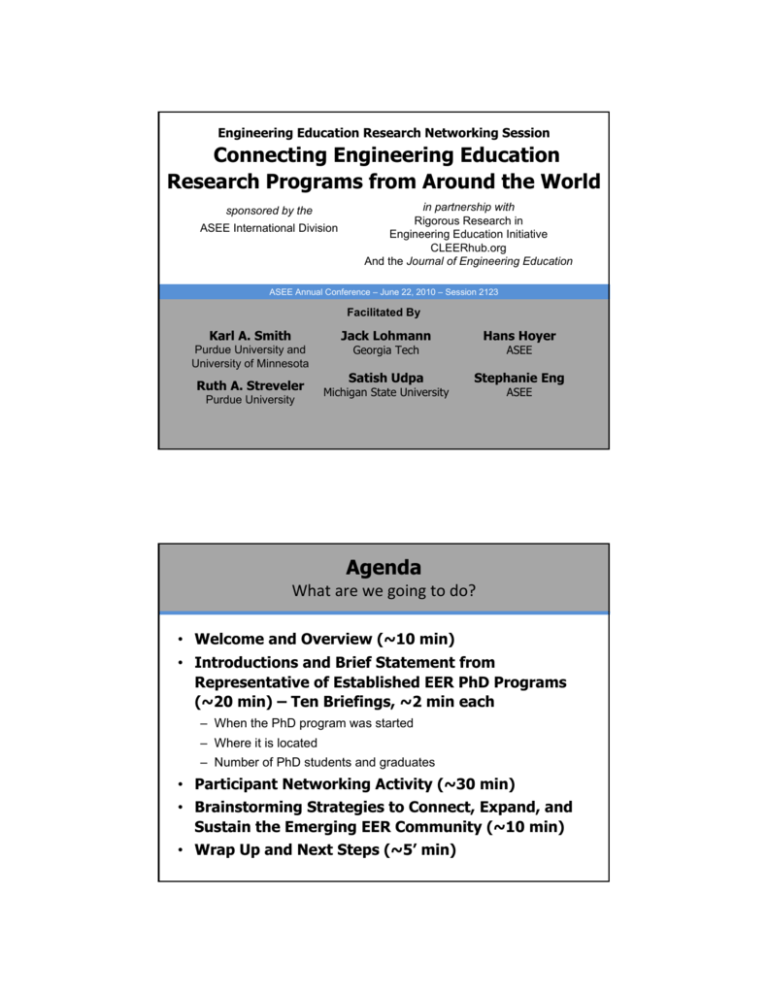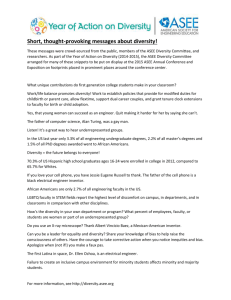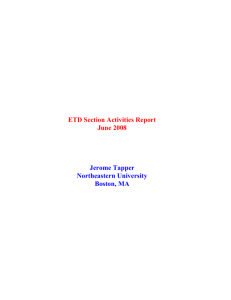Connecting Engineering Education Research Programs from
advertisement

Engineering Education Research Networking Session Connecting Engineering Education Research Programs from Around the World sponsored by the ASEE International Division in partnership with Rigorous Research in Engineering Education Initiative CLEERhub.org And the Journal of Engineering Education ASEE Annual Conference – June 22, 2010 – Session 2123 Facilitated By Karl A. Smith Purdue University and University of Minnesota Ruth A. Streveler Purdue University Jack Lohmann Hans Hoyer Satish Udpa Stephanie Eng Georgia Tech Michigan State University ASEE ASEE Agenda What are we going to do? • Welcome and Overview (~10 min) • Introductions and Brief Statement from Representative of Established EER PhD Programs (~20 min) – Ten Briefings, ~2 min each – When the PhD program was started – Where it is located – Number of PhD students and graduates • Participant Networking Activity (~30 min) • Brainstorming Strategies to Connect, Expand, and Sustain the Emerging EER Community (~10 min) • Wrap Up and Next Steps (~5’ min) EER PhD Program Briefings • Utah State University – Kurt Becker • Purdue University – David Radcliffe & Robin Adams • Universidad de las Americas, Puebla, Mexico – Enrique Palou • Virginia Tech – Maura Borrego • Universiti Teknologi Malaysia – Zaini Ujang • Clemson University – Lisa Benson • NITTTRs – India – R. Natarajan • Arizona State University – Tirupalavanam Ganesh & Chell Roberts • University of Washington – Cindy Atman • Ohio State University – Lisa Abrams • Carnegie Mellon University – Paul Steif • University of Michigan – Cindy Finelli • Washington State University – Denny Davis • University of Georgia – Nadia Kellam & Joachim Walther • Michigan State University – Jon Sticklen • University of Colorado – Boulder – Daria Kotys-Schwartz Kurt Becker – Utah State University http://www.engineering.usu.edu/htm/information/phd-engineering-education Robin Adams – Purdue University https://engineering.purdue.edu/ENE/Academics/Graduate/Doctorate/index.html GOALS •Conduct world‐class research on teaching and learning of science, engineering and technology • Scholarship of discovery •Use the results of that research to continually improve instruction at UDLAP, Mexico and other Ibero‐ American countries to better support the learning process of our students • • Fall 2003 • • Fall 2006 • • Center for Science, Engineering, and Technology Education PhD program Spring 2008 • Fall 2009 • Fall 2010 • • •Support the educational needs of science, engineering and technology teachers and learners at the P‐12, University, and continuing professional development levels • program accredited by the National Council of Science and Technology (CONACyT) of Mexico • Scholarship of application, integration, and teaching • Mexican private institution of higher learning – accredited in the US since 1959 by SACS Scholarship of application, integration, and teaching first graduate ≈ 40 PhD students www.udlap.mx/ofertaacademica_eng/doctorados/educacioncienciasingenieria/Default.aspx Enrique Palou Universidad de las Americas Maura Borrego – Virginia Tech http://www.enge.vt.edu/ UTM in brief: From imperial technical school to national research university by o The oldest university in Malaysia o Alumni more than 200,000 o More than 43% enrolment at graduate levels in UTM student profile Year Bachelor Zaini UJANG, UTM President Graduate 1984 3,886 2 1990 5,348 175 2004 17,897 3,291 2007 14,792 3,942 2008 14, 456 4,850 2009 14,245 6,432 2010 13,000 8,000 2011 11,500 9,000 2012 10,000 10,000 zaini@utm.my and http://www.utm.my/vc engineering and technology in Malaysia 10 engineering schools 2000 tenured academics 5000 students Global Outreach Program 2,800 foreign students 2010 Initiatives with Oxford, Imperial College, MIT, Harvard, Tokyo, Caltech, Pann State etc o Prof. Richard R. Ernst Nobel Laureate in Chemistry 1991 “…fulfills a major … highly qualified graduate engineers and professionals … become an international center of knowledge and education.” o o o o o Vision: The department will be an international leader in engineering and science education through discipline-based education research, preparation of future faculty, and implementation of inclusive, evidence-based curricula. Lisa Benson – Clemson University http://www.clemson.edu/ese/ PHD PROGRAMS IN ENGINEERING EDUCATION IN INDIA ¾ Doctoral Programs in Engineering Education are offered in the four NITTTRs ( National Institutes of Technical Teachers’ Training Institutes ) at Bhopal(West zone), Chandigarh(North zone), Chennai(South zone ), and Kolkata(East zone). ¾ The candidates are essentially from Engineering Colleges, Polytechnics, NITTTRs and Industry. The Guides are from the host NITTTRs. The degrees are conferred by a neighboring University . R. Natarajan – IIT Madras 10 Arizona State University: Engineering Education Doctoral Program http://engineeringed.asu.edu Program Coordinator: Tirupalavanam Ganesh, tganesh@asu.edu TWO PATHS PHD Mechanical Engineering (Engineering Education Concentration) The engineering education concentration is interdisciplinary and will combine research in engineering with research in education. The concentration provides students with an opportunity to explore pedagogy, methodology, curriculum and instruction and apply it to engineering. PHD Curriculum and Instruction (Engineering Education Concentration) The concentration in engineering education within the Ph.D. in curriculum and instruction provides opportunities for interdisciplinary research in the teaching and learning of engineering, pre-K to college, by integrating research methods in learning theory, curriculum development, assessment, evaluation and education with a particular understanding of engineering content and practice in a variety of contexts. Chell Roberts – Arizona State University http://technology.asu.edu/engineering Cindy Atman – University of Washington http://www.hcde.washington.edu/nav-prog-advise/phd Lisa Abrams – Ohio State University http://people.ehe.ohio-state.edu/stem/ Participant Networking Activity (~30 min) • Introductions with Guided Format • Four (~7 min) Conversations in Groups of 2-3 – Your Name & Organization – Status of EER PhD Program/Interest in EER PhD Program – Suggestions for Starting/Questions About Starting – Exchange Business Cards/Contact Information – Identify “intellectual neighborhoods” around common research, organization or other questions and interests – Talk about ways to follow up • Bell will ring once after 6 min and twice after 7 min • Move to a New Group Connecting, Expanding & Sustaining the Emerging EER Community (~10 min) • Small Group (2-3) Brainstorming – Ideas for (1) local, (2) national, (3) international Community – Ideas for Virtual Community – Further Ideas • Summarize Ideas and Write on 3x5 card Next Steps (~ 5 min) • Silently reflect on your interests and plans for engineering education research • Jot down – What do you plan to do next? – What are your longer range plans? • Continue the conversation during the ASEE conference and beyond – EER Networks – REEN, SEFI, CLEERhub – Meet again at ASEE/IEEE FIE Conference, October, 2010 http://grou.ps/reen http://www.sefi.be/?page_id=1192 http://cleerhub.org Engineering Education Research Networking Session Connecting and Expanding the Engineering Education Research Community sponsored by the ASEE Educational Research and Methods Division in partnership with Rigorous Research in Engineering Education Initiative CLEERhub.org And the Journal of Engineering Education IEEE/ASEE Frontiers in Education Annual Conference – October, 2010 – Session 1360 Ruth A. Streveler Karl A. Smith Purdue University Purdue University and University of Minnesota Acknowledgement • We acknowledge the National Science Foundation for funding Karl Smith & Ruth Streveler’s participation (DUE 0817461) – COLLABORATIVE RESEARCH: Expanding and sustaining research capacity in engineering and technology education: Building on successful programs for faculty and graduate students • And the American Society for Engineering Education International Division for Sponsoring Thank you! An e-copy of this presentation will be posted to: http://CLEERhub.org ASEE Annual Conference – June 22, 2010 – Session 2123 Karl A. Smith Purdue University and University of Minnesota Ruth A. Streveler Purdue University Jack Lohmann Hans Hoyer Satish Udpa Stephanie Eng Georgia Tech Michigan State University ASEE ASEE


